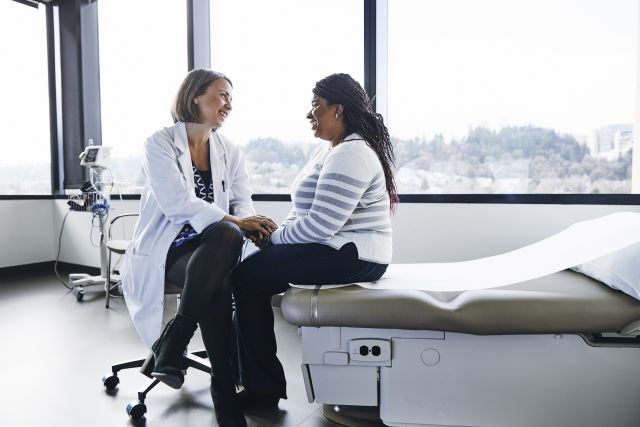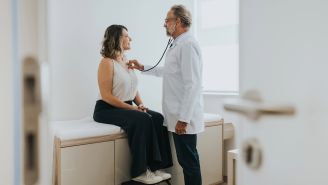Updated on June 26, 2024.
Have you experienced adult acne and irregular periods? The cause might be polycystic ovary syndrome (PCOS).
PCOS is an endocrine system disorder, meaning it involves imbalances in reproductive hormones. It’s estimated to affect 4 to 10 percent of women and people assigned female at birth between the ages of 15 to 44. Most cases are observed between the ages of 20 and 30.
PCOS causes a range of changes to the body. In addition to altering a person’s physical appearance, it can affect menstrual cycles and reproductive health. While the outward changes may be more noticeable, it’s important to understand what’s going on beneath the surface when someone has PCOS.
What happens to the body with PCOS
People with PCOS have elevated levels of a hormone called androgen. When androgen levels in a woman’s body are higher than normal, they may develop traits characteristic of men. These can include male-pattern baldness or excess hair growth on the face, chin, and elsewhere.
People with PCOS may also experience weight gain, acne, a darkening of the skin in certain areas (such as around the neck, armpits, groin, and under the breasts), and development of skin tags (excess flaps of skin around the neck and breasts).
They may also develop cysts around the edges of the ovaries. These cysts are small fluid-filled sacs that contain immature eggs. They typically cause the ovaries to grow bigger and stop working properly.
Another major symptom of PCOS is irregular menstrual periods.
“During a normal menstrual cycle, you spend about half of the time building up the lining of the uterus to get ready for a pregnancy,” says Kathryn Born, MD, an OBGYN with Trinity Health Medical Group, Obstetrics and Gynecology, in Grand Rapids, Michigan. “Then, the second half of the cycle, after ovulation, the lining is stabilized and just waiting for pregnancy."
If you aren’t pregnant, the uterine lining sloughs off. This leads to a regular menstrual period. Because women with PCOS don’t ovulate regularly, the uterine lining continues to thicken, which can lead to heavy bleeding after ovulation or when you haven’t ovulated. This, in turn, can increase the risk of endometrial cancer.
PCOS may also make it difficult for a woman to get pregnant.
“Fertility in a perfectly normal cyclic woman is only about 15 to 20 percent per cycle,” Dr. Born says. “If you drastically reduce the number of cycles that a woman has, and then decrease her ability to predict when she's ovulating, there's going to be a decrease in fertility.”
Links between PCOS and other conditions
Experts believe PCOS is strongly linked to conditions like diabetes, obesity, high cholesterol and high blood pressure. All of these are also risk factors for heart disease, which is the leading cause of death in the United States.
Mental health disorders, such as depression and anxiety, also tend to be more common in people with PCOS, according to a 2023 review of research published in JAMA Network Open. It remains unclear whether one causes the other or if metnal health conditions and PCOS may have other contributing factors in common.
What causes PCOS?
The potential causes of PCOS are diverse and hard to pinpoint. “There's a lot of evidence that says that it is multifactorial, that it may be somewhat inherited, but there are certainly components of it that are not,” says Born.
A variety of factors may contribute to the development of PCOS. These may include:
- Genetic factors (traits that you inherit from parents)
- Obesity
- Diet and lifestyle choices
- Gut dysbiosis (an imbalance in the populations of bacteria living in your digestive tract)
- Exposure to certain environmental pollutants, such as those that influence levels of hormones in the body (known as endocrine disrupting chemicals, or EDCs)
Working on their own or together, these factors may lead to processes in the body that can give rise to PCOS, including:
- Excessive secretion of androgen from the ovaries
- Insulin resistance (a condition that makes it difficult for the body to process blood sugar and is a precursor to diabetes)
- Disruption of the ovaries’ ability to produce eggs
- Chronic inflammation in the body
- Metabolic syndrome
Metabolic syndrome is a constellation of issues that typically includes abdominal obesity (excess fat around the belly), high blood pressure, high blood triglycerides (a kind of fat in the blood), low levels of HDL (aka “good” cholesterol), and insulin resistance.
The road to diagnosis
There is no single test that leads to a PCOS diagnosis. Instead, healthcare providers (HCPs) must rely on general physical exams, pelvic exams, and blood tests to eliminate the possibility of other conditions. After other conditions are ruled out, a patient must present with at least two of the following issues to be diagnosed with PCOS:
- Irregular menstrual periods
- High levels of androgen in the blood, which may cause excess hair growth, baldness, or acne
- Cysts on one or both ovaries
“Diagnosis can happen anywhere from teenage years to 20s and 30s,” Born says. It's most common in teens, when their periods fail to become regular, or later on, when women are trying to conceive.
Treatment methods for PCOS
PCOS treatments vary based on the goals of the patient. If they aren’t trying to conceive, birth control is usually prescribed to regulate menstrual periods and counter the effects of excess androgen, like acne. If birth control does not help, medications like spironolactone may be used to reduce the appearance of these symptoms.
If a patient is looking to conceive, weight loss will likely be an important part of treatment.
“At least 50 percent of women with PCOS are overweight and there's a lot of data that suggests that the fertility is improved by even just a 5 to 10 percent weight loss,” Born says. An HCP might also prescribe medication to help improve fertility, including clomiphene (Clomid), aromatase inhibitors, or certain diabetes medications.
A person with PCOS will have the condition for the rest of their life, and with it, an increased risk of metabolic disorders (like diabetes) and heart disease. The good news is that many of the common symptoms of PCOS go away after menopause. These include irregular periods, acne, and hair growth.
If you think you’re experiencing signs of polycystic ovarian syndrome, speak with your HCP about PCOS diagnosis and treatment options.







